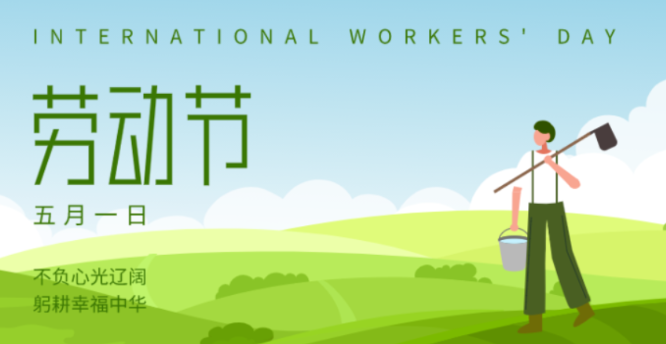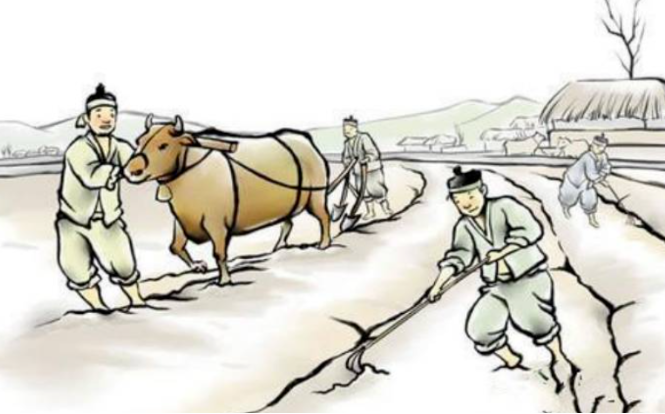Let's take a look at the Labor Day in ancient China

In 1889, at the congress of the Second International held in Paris, led by Engels, people unanimously agreed to set May 1 as International Labor Day, as a holiday for workers around the world. In December 1949, China determined May 1 as Labor Day. With a long history, did the Chinese nation also have Labor Day in ancient times? Check the information, actually really have! Although there is no clear name for "Labor Day", the tradition of "labor glory" has a long history. People have long realized the importance of labor, and appreciate the beauty of life in labor, hard work, diligence and bravery have also become one of the traditional virtues of the Chinese nation.

The Chinese culture has a long history, and under the nourishment of thousands of years of farming civilization, the ruling class has long understood the truth of rest and rest, attaches importance to labor, honors labor, and eulogizes the working people, which is an important measure of the state governance of official institutions in successive dynasties. Therefore, in the history of China for the working people to celebrate the ancient.
The second day of February :Ploughing Festival
According to historical records, China's Labor Day can be traced back to the Three emperors and five emperors period. As the saying goes, "February 2, the dragon raises its head, the big barn is full of small barn flow." According to the farming experience, the temperature is warming at this time, the rain is increasing, and in the ancient times, it is a good time for spring ploughing.

Every year on the second month of the lunar calendar, the ancient god Fuxi would lead the leaders of the tribal alliance to "imperial farming" and set an example to work in the fields. Sima Qian also recorded in the "Records of the Grand Historian" that King Wu Ji Fa in the Western Zhou Dynasty led civil and military officials to personally cultivate in February every year, and designated this day as the "Spring Dragon Festival".

During the Tang Dynasty, February 2 was officially designated as "Farming Festival", also known as "Labor Day", which became the earliest Labor Day in ancient China. On this day, farmers will tie red silk on farm tools, which means that the days are prosperous, happy and auspicious, and pray for a good harvest.
There is also the tradition of robbing divine cows - local officials will organize people to sacrifice, and then break the mud cow as a sacrifice, so that everyone can fight for it. Whoever grabs these pieces of mud and puts them in their fields will have a good harvest for the year.

During the Ming and Qing dynasties, the emphasis on the second month of February rose to an unprecedented height. The Yongzheng Emperor of Qing Dynasty would personally plow the fields in the "One Mu Garden" on the west side of the Yuanmingyuan. The Qing Dynasty also stipulated: "where more than 70 tillers, free from taxes and miscellaneous, labor festival reward silk, cotton ten jin, one stone." An ancient folk song once vividly depicted the scene of the ploughing festival. February two, dragon head up, Tianzi farmland minister drive cattle, official palace Niang to send rice, when the minister to throw the seed, spring ploughing summer weeding rate of the world, grain Fengdeng peace autumn. Other "Labor Day" can be said in ancient China, where the people depend on food, labor is everywhere, and the deductive process of Labor Day is also varied, in addition to February 2, the ancients also put many festivals as a symbol of Labor Day.

Qingming and grain rain
Qingming and grain rain As the saying goes: "Qingming grain rain two connected, soaked seed farming mo delay." In other words, the period between Qingming and grain rain is particularly suitable for agricultural activities. The agricultural book "Agricultural Miscella" gives the reason: "Qingming breaks snow, grain rain breaks frost." A year's plan begins with spring. After Qingming and grain rain, frost and snow melt, the weather becomes warm, just for spring ploughing.

In Rongcheng and other places along the coast of Shandong province, April 20 is the traditional fishing Day. The festival originated from grain rain and was renamed "Fishing People's Day" during the Daoguang period of the Qing Dynasty. Coastal fishermen will toast to the goddess of the sea on the day of Grain rain, and then set sail on the sea.
Emperor Kangxi once wrote in "Spring Snow" : "Agricultural east domain can be planted, diligent people are worthy of spring." Qianlong said in "Watching tea and Composing songs" : "If there is no reason to avoid picking tea, men and women will be tired." In order to create a strong festive atmosphere, during the Qingming Festival and grain rain, farmers will tie red silk on farm tools when sowing seeds in the ground to celebrate.
July 7th: Begging Festival
July 7th July 7th is not Qixi Festival, is it China's own Valentine's Day? Why is it Labor Day again? In fact, in addition to the day when the cowherd and the Weaver meet, the seventh day of July is also known as the "Begging Day." To beg is to beg. Clever, means clever. In the Han Dynasty, people would make a variety of dim sum on this day and put it in the courtyard, inviting the celestial Weaver girl to comment on it, so that they could become skillful.

"The Book of Songs · Intemet and wind · July" describes the farming picture of the ancient working people: "The fire in July, the clothes in September. One day Piri hair, two days Li lie; No clothes no brown, how to pass the year? Three days in the plow, four days of toe. With my wife, he Nan mu. Chun joated." It describes an ancient farming map of working people. Therefore, in July, the hottest lunar month of the year, people work in the fields during the day, and celebrate the Begging Festival at night to experience the happiness after labor.
September 9th: Double Ninth Festival
September 9th Yes, September 9th Double ninth Festival is also Labor Day, is the last Labor Day of the year. If the second dragon raised its head in February is the beginning, then the ninth Double Ninth Festival in September is the end and the day of harvest.

"Lu's Spring and Autumn · Jiqiuji" records: "(September) ordered the family to slaughter, farming ready to harvest, five kinds of important. ... The day also, the great Emperor, taste sacrifice, inform the son of Heaven." This shows that as early as the early Qin Dynasty, people would worship the Heaven Emperor and ancestors after the autumn harvest in the ninth lunar month to celebrate the harvest. This day is also known as "Ci Qing Day" - after the ninth day of September, the grass and trees gradually fade, the green color turns yellow, the weather turns cold, and the farming activities end immediately. People who have worked hard for a whole year can enter the idle season after the celebration. Therefore, ancient wars usually took place after the autumn harvest on September 9 and ended before February 2 of the following year, so as not to affect agricultural production. The state of Qin is based on farming, and the autumn harvest in September is the end of the year, and October is the beginning of the New Year.

From this point of view, ancient China not only has Labor Day, but also up to civil and military officials and civilian cloth clothing will participate in labor. And now is very different, there are many ancient Labor Day, but not on May 1, and the ancient labor Day does not have a holiday, but the public collective to the field, with practical action to interpret the beauty of labor. In the view of the ancients, festivals related to labor are not limited to a certain day or a certain month, because labor is the eternal theme of human beings, every festival of labor, every sacrifice to pray for the fruits of labor, can be regarded as "Labor Day".


